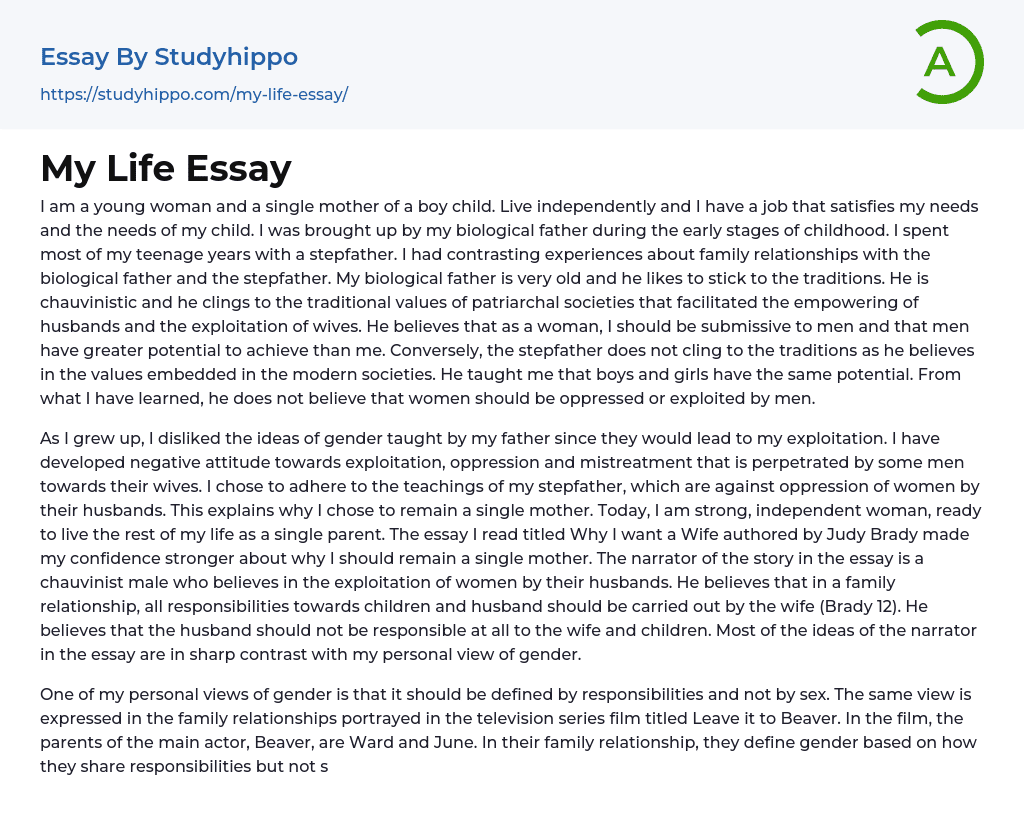I am a young woman and a single mother of a boy child. Live independently and I have a job that satisfies my needs and the needs of my child. I was brought up by my biological father during the early stages of childhood. I spent most of my teenage years with a stepfather. I had contrasting experiences about family relationships with the biological father and the stepfather. My biological father is very old and he likes to stick to the traditions. He is chauvinistic and he clings to the traditional values of patriarchal societies that facilitated the empowering of husbands and the exploitation of wives. He believes that as a woman, I should be submissive to men and that men have greater potential to achieve than me. Conversely, the stepfather does not cling to the tradit
...ions as he believes in the values embedded in the modern societies. He taught me that boys and girls have the same potential. From what I have learned, he does not believe that women should be oppressed or exploited by men.
As I grew up, I disliked the ideas of gender taught by my father since they would lead to my exploitation. I have developed negative attitude towards exploitation, oppression and mistreatment that is perpetrated by some men towards their wives. I chose to adhere to the teachings of my stepfather, which are against oppression of women by their husbands. This explains why I chose to remain a single mother. Today, I am strong, independent woman, ready to live the rest of my life as a single parent. The essay I read titled Why I want a Wife authored b
Judy Brady made my confidence stronger about why I should remain a single mother. The narrator of the story in the essay is a chauvinist male who believes in the exploitation of women by their husbands. He believes that in a family relationship, all responsibilities towards children and husband should be carried out by the wife (Brady 12). He believes that the husband should not be responsible at all to the wife and children. Most of the ideas of the narrator in the essay are in sharp contrast with my personal view of gender.
One of my personal views of gender is that it should be defined by responsibilities and not by sex. The same view is expressed in the family relationships portrayed in the television series film titled Leave it to Beaver. In the film, the parents of the main actor, Beaver, are Ward and June. In their family relationship, they define gender based on how they share responsibilities but not simply in the terms of sex. For instance, both June and Ward take an active role in guiding and counseling Beaver and providing him with the basic necessities of life (Connelly and Mosher). However, the idea expressed in the film that the role of women should only be to take care of household responsibilities as the father works is in contrast with my idea of gender roles. Beaver’s mother stays at home to concentrate on household chores and bringing up children while Ward concentrates on work (Connelly and Mosher). I believe that in the modern society, the woman should not be fully restricted to work. Also, I am against the idea of exploitation of
women by husbands expressed by the father of a friend of Beaver called Larry Mondello. The father of Mondello is a business man that does not spare time to take care of his children and leaves all home responsibilities to his wife except supporting his family financially (Connelly and Mosher). I believe that both the husband and wife should share the responsibility. Last, I am against the negative view of the single parents by the societal members as expressed in the film. Single parenthood, in my view, is one of the modern families that should be accepted and respected.
Overall, I am confident with my status as a strong single parent. My ideas of gender have been built gradually from childhood to the present. My father and stepfather contributed in building my ideas of gender and how familial relationships should be. My encounters during adulthood have also shaped my perception of gender and gender roles. Some of the ideas expressed in the Leave it to Beaver film are similar to mine while others are not.
Works Cited
Brady, Judy. “Why I want a Wife.” Ms. Magazine, Inaugural issue. 1971, Pp, 12-14.
Connelly, Joe and Bob Mosher, writers. Leave it to Beaver. Gomalco Productions and Kayro Productions, 1957.
- Boy essays
- Gay essays
- Gender essays
- Gender Identity essays
- Gender Roles In Society essays
- Gender Stereotypes essays
- Girl essays
- Homosexuality essays
- Human Sexual Behavior essays
- Lgbt essays
- Man essays
- Masculinity essays
- Sexual Orientation essays
- Transgender essays
- Woman essays
- Adaptation essays
- Adventure essays
- Adversity essays
- Aging essays
- Alcohol essays
- Barbie Doll essays
- Beauty essays
- Care essays
- Carpe diem essays
- Change essays
- Chess essays
- Chicken essays
- Choices essays
- Contrast essays
- Crops essays
- Development essays
- Dream essays
- Evil essays
- Experience essays
- Family essays
- Farm essays
- Fire essays
- First Love essays
- Focus essays
- Greed essays
- Hero essays
- Holiday essays
- House essays
- Housing essays
- Humility essays
- Humor essays
- Hypocrisy essays
- Integrity essays
- Law of Life essays
- Life Changing Experience essays




